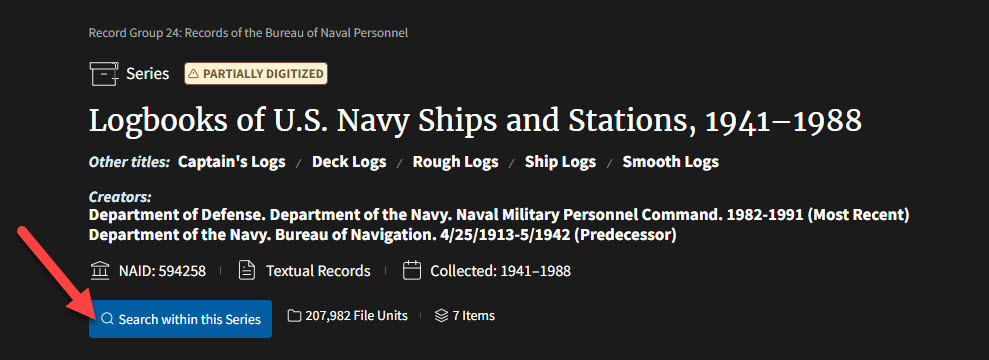
Using the National Archives Catalog
What is in the National Archives?
What is the National Archives Catalog?
What Will I Find in the National Archives Catalog?
What Won’t I Find in the National Archives Catalog?
How to Search
Viewing Search Results
Refining a Search
Searching for Names
Searching Within a Record Group, Series, or File Unit
Using the Advanced Search
Catalog Accounts with Login.gov
Citizen Archivist
Extracted Text
Exporting Records
Saving a Digital Copy
Electronic Records Files
Acronyms and Abbreviations
Accessibility for Persons with Disabilities
Contact Us
What is in the National Archives?
The National Archives and Records Administration (NARA) acquires, preserves, and makes available for research the records of enduring value that were created or received by organizations of the executive, legislative, and judicial branches of the Federal Government. Records in the custody of the National Archives date from pre-federal times to the present. Most of the records are textual, but they can come in a wide variety of media, such as microfilm, maps and charts, architectural and engineering plans, aerial photographs, motion picture reels, video recordings, sound recordings, computer data sets, or still pictures.
What is the National Archives Catalog?
The National Archives Catalog is the online portal to the records held at the National Archives, and information about those records. It is the main way of describing our holdings and also provides access to electronic records and digitized versions of our holdings.
The Catalog searches across multiple National Archives resources at once, including archival descriptions, digitized and electronic records, and authority records. The Catalog also allows users to contribute to digitized historical records through tagging and transcription.
The Catalog currently contains archival descriptions of the National Archives’ holdings, authority records, and millions of digitized and electronic records. Over 95% of the National Archives’ holdings are described at the series level.
How are records in the Catalog organized?
Records described in the Catalog are organized according to NARA’s archival hierarchy, which is defined in the Lifecycle Data Requirements Guide (LCDRG) - NARA’s standard for archival description.
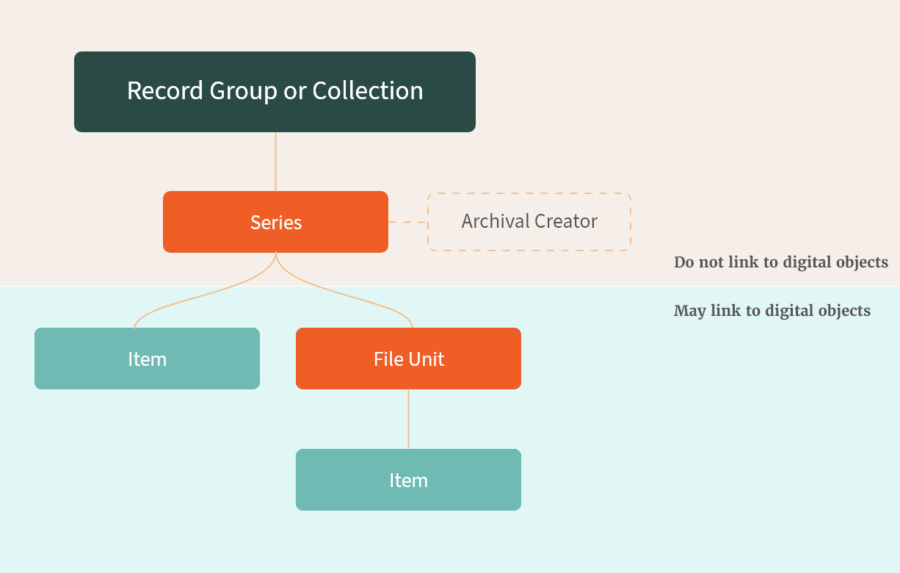
Record groups and collections are the highest level of archival description. Record groups most often contain accessioned records from federal agencies. Collections are generally made up of non-federal records that were donated to NARA, usually from presidential administrations.
Beneath the record group or collection is the series. A series is a group of records that are related as the result of being created, received, or used in the course of the same activity. The series is the descriptive level that is connected to the archival creator - the person or organization who created and/or maintained the records.
And beneath the series are file units or items. File units contain a more specific collection of related records within a series. A file unit often contains multiple discrete records, for example a grouping of memos. File units are always contained by series, while items can be contained by either series or file units. An item often reflects a specific record, for example a single memo. Both file units and items can contain digital objects, such as digitized pages produced from analog holdings.
What Will I Find in the National Archives Catalog?
The Catalog searches across multiple National Archives resources at once, including archival descriptions, digitized and electronic records, optical character recognition (OCR) text of digitized textual records, authority records. The Catalog also allows users to contribute to digitized historical records through tags, comments, and transcriptions, which are also searchable in the Catalog.
What Won’t I Find in the National Archives Catalog?
We do not hold records of state, county, city, or town governments, or of churches or other private institutions. Therefore, we do not have:
- Vital records - These most commonly refer to records such as birth and death certificates, marriage licenses and divorce decrees, wills, and the like. These records are created by local authorities, with possible exceptions for events overseas, in the military, or in the District of Columbia. They are not considered Federal records; therefore, they are not held by NARA.
- Information about applying for tribal membership. Membership is determined by the individual tribes.
- Records from state or county courts.
- State militia records. For these records, you will need to contact the appropriate State Archives.
Records that are not open for public access may be described in the Catalog; however, digital copies of restricted and unprocessed records will not be available in the Catalog. This includes:
- Information to help locate living individuals. The records in the custody of the National Archives are usually at least 20-30 years old, and information on living individuals is protected by the Privacy Act.
- Records that NARA has accessioned but not yet processed. See information about New Accessions.
- Presidential records that are within five years of the President leaving office. The Freedom of Information Act (FOIA) applies to the Presidential Records Act (PRA) five years after the President has left office. NARA uses this time to begin to conduct archival processing and otherwise prepare for the onset of public access.
- Classified records and records undergoing review for declassification.
The number of digital images in the catalog increases almost daily as a result of digitization. Even though the catalog contains hundreds of millions of digital images, it’s still just a small percentage of our holdings.
How to Search
For best performance, Google Chrome, Microsoft Edge, and Safari web browsers are recommended when accessing and searching the Catalog.
Enter one or more keywords in the search box and press enter on your keyboard, or click on the magnifying glass icon.
If you enter more than one keyword, the Catalog combines them with an 'AND' so that the search obtains results containing all the keywords.
Viewing Search Results
Catalog groups all search results together under "All Records" and ranks them based on their relevance to your search terms or parameters. All records include descriptions and descriptions that include digitized records. Users may select “Available to access online” to view only descriptions that include digitized records.
1. By default, 20 results are shown on the first page. To view more results, click on page numbers or the arrows to advance to additional pages.
2. To increase the number of results displayed on each page, select the Results per page drop-down arrow.
Sorting Search Results
By default, the search results are ordered by the most relevant first. Change the sort order by choosing an alternative from the drop-down Sort by button at the top of the search results screen.
The sort options include:
- Relevance (default)
- Title
- National Archives Identifier
Viewing Full Results
-
To view a full result, click on the Title link in the results display.
-
If there is a digital copy, navigate between pages of a document using the previous and next buttons below the image or by clicking on one of the thumbnails to the right of the image viewer.
-
Scroll down to view the full description details. To go back to the search results page, click Back to Search Results in the upper left corner of the screen.
Refining a Search
The following search refinements allow you to narrow your search results:
- Type of Materials (e.g. Textual Records, Moving Images, Sound Recordings)
- Part of Collections
- Part of Record Groups
- Level of Description (Record Group, Collection, Series, File Unit, Item)
- Data Source (Archival Descriptions with Digital Objects, Archives.gov, Archival Descriptions, Authority Records)
- File Format (e.g. Image (JPG), Portable Document File (PDF))
- Location (e.g. reference unit)
- Date (year ranges)
Search refinements are provided on the left side of the search results page.
- Enter a search term or keyword phrase.
- On the results page, click on one of the search refinement options on the left side of the screen. The search will be refined further based on the new criteria added.
- The selected refinement will be displayed below the Refine, followed by an "X" (e.g., Refinements: Type of Archival Materials: Moving Images x). You may select additional refinements to further narrow your search results.
- Click on the "X" following a refinement to remove the refinement and return to the original set of search results.
Searching for Names
A common challenge reported by Catalog users is searching for names of ordinary people. While Catalog descriptions may mention public figures or people who figure prominently in the records, they cannot list every person's name. Names may be found through the Optical Character Recognition (OCR) layer applied to digitized records, but results can vary. As a result you may need to try several different searches using different strategies when searching for a name.
- Try searching on the person's full name in first name-last name as well as last name-first name order.
- Place your name within quotes so that the Catalog searches the name in that exact order. A search for Abraham Lincoln would search for Abraham OR Lincoln while a search for “Abraham Lincoln” would search for Abraham AND Lincoln.
- Search on the surname only. The records might only include a first initial or a variant spelling of the first name.
- Search on variant spellings of the surname using OR, for example: Luchetti OR Lucetti.
- Search on variant spellings of the first name, including "Americanized" versions, for example: Joseph Maggio OR Guiseppe Maggio.
- If you are searching for a public figure, try a search of the name using the search tips provided above or do an Advanced Search, selecting Person or Organization from the Keyword dropdown menu.
- Keep in mind that most descriptions in the National Archives Catalog do not include the names of individuals in that record. However, the National Archives still might have records about your ancestors. If you know an individual participated in an event, search for that search term and look within the records for the particular name.
- Due to privacy concerns, military records from World War I to the present are not available in the Catalog. Please visit Veterans’ Service Records for information on how to order military records.
- Most naturalization records are not available in the Catalog. If a naturalization took place in a Federal court the records will usually be in the National Archives facility serving the state in which the Federal court is located.
Searching Within a Record Group, Series, or File Unit
You may also perform a “search within” to search only for records contained within a particular Record Group, Collection, Series, or File Unit. To do so, navigate to the main description page for the Record Group, Collection, Series, or File Unit, and click on the blue hyperlink “Search within this Record Group/Collection/Series/File Unit” found in the black header below the title information.
This will take you to a page where you can search within using keywords in the search bar. Remove any existing words from the search bar and type a name, subject, or other keyword in the search bar.
Additionally, you can find another “search within” link in the Inside this… section of the description.
If you wish to specify your search more precisely than is possible using a basic search, click on the Advanced link next to the main search text box. Use the drop-down menus to further refine the advanced search options.
Please note that all of the Advanced search options except for Data Source only apply to Archival Descriptions, Archival Descriptions with Digital Objects, or Authority Records.
For more information on constructing searches with the parametric search boxes, see Search Tips.
Catalog Accounts
A National Archives Catalog account is not required to use or search the Catalog. However, there are benefits to creating an account and logging in to search, such as:
- Contribute as a Citizen Archivist by adding tags, transcriptions, and comments.
- More search results are displayed
By signing up for a Catalog account you will be subscribed to the National Archives Catalog Newsletter. The Newsletter is emailed every other Thursday and you can unsubscribe at any time by clicking on the “unsubscribe” link at the bottom of each newsletter.
The National Archives Catalog uses Login.gov to allow you to securely register and sign in to your user account safely and securely. Learn more about Login.gov in our Help Center.
Citizen Archivist
For instructions on how to contribute as a Citizen Archivist, please visit our Register and Get Started page, watch How to Transcribe in the National Archives Catalog and review our other how-to instructions found on the Resources page. When you are ready to contribute, visit Citizen Archivist Missions.
Extracted Text
Viewing and Using Extracted Text
You can view and use the machine-generated extracted text for many of our records in the Catalog. We’re hoping that this new feature will improve accessibility and searchability of our records, but the extracted text, especially handwritten text, is far from perfect. We still need human eyes to review the extracted text if you choose to use it for transcription. See the instructions below to watch this video to learn how to use extracted text for transcription.
Using extracted text for transcription
To view the extracted text for transcription, click on the Extracted Text button above the image of the document. This will open the extracted text panel.
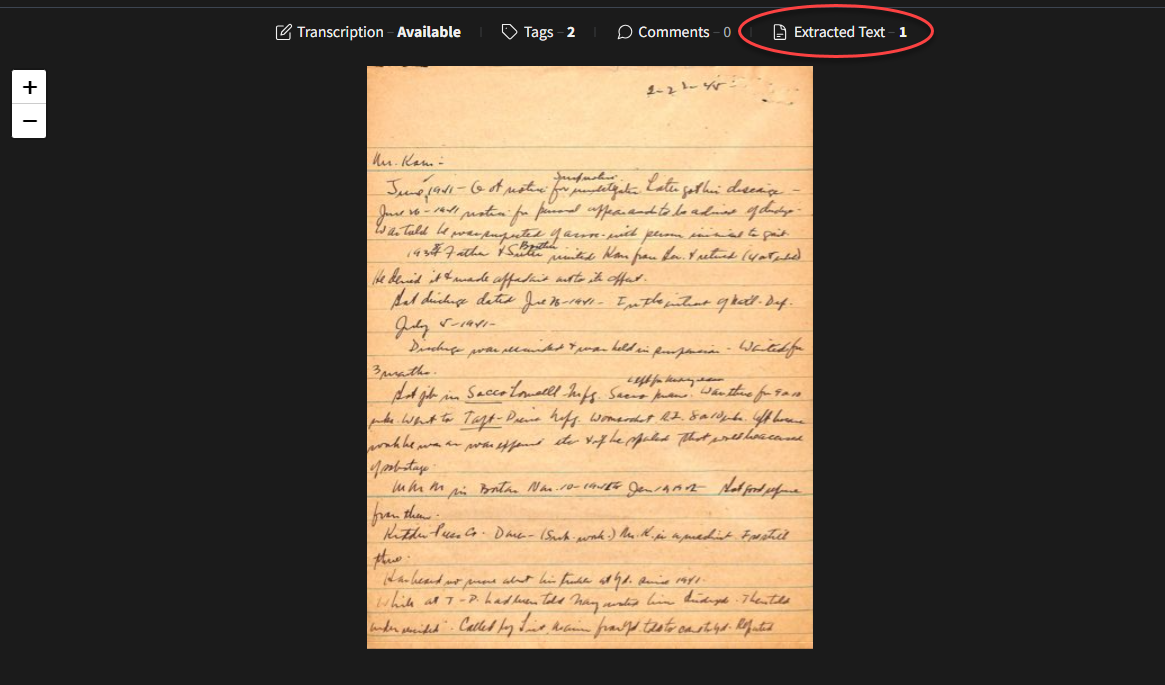
Highlight and copy the extracted text using your cursor / mouse or keyboard.
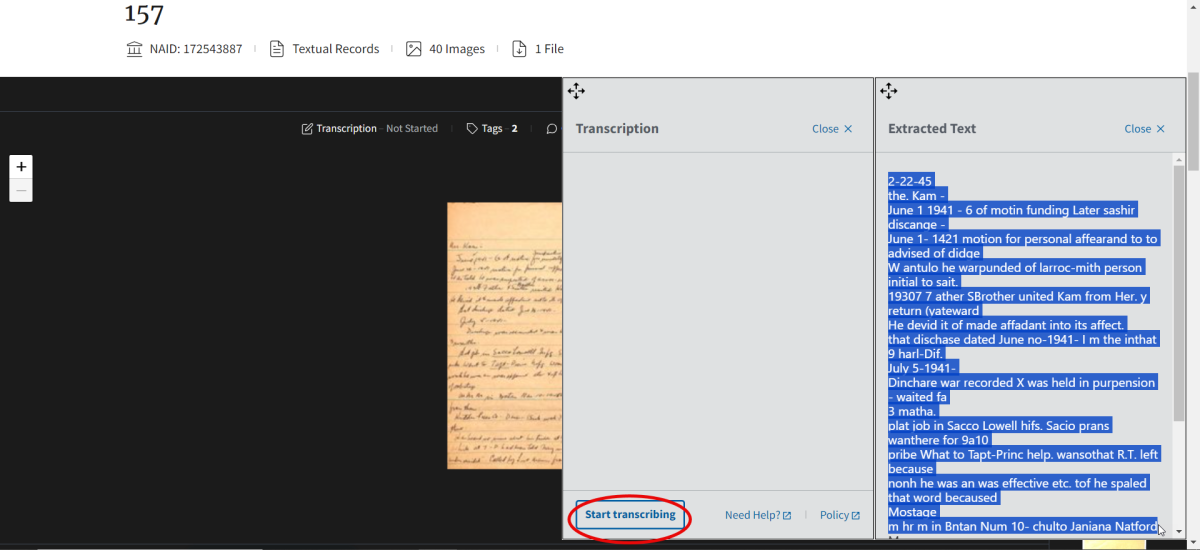
Click on the Transcription button above the image to open the transcription window. Click the Start Transcribing button. Paste the extracted text into the transcription window.

Now you can make any necessary changes to make the extracted text more accurate. Click Publish and Close when you are finished. For transcription help, check out our additional details and tips for getting started with transcription.
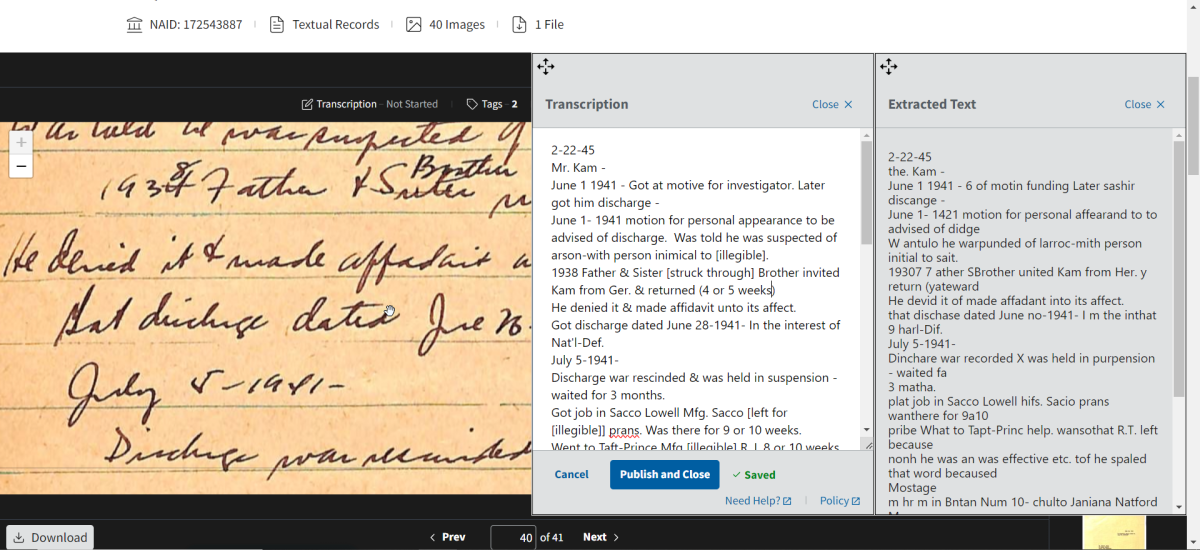
Exporting Records
If you would like to export one or more descriptions from the Catalog, follow these steps:
Click the white box in the top left of the thumbnail (indicated by the arrow below) to individually select one or more records, or click Select All (circled below) to select the entire page. Click the three dots for more Select All options
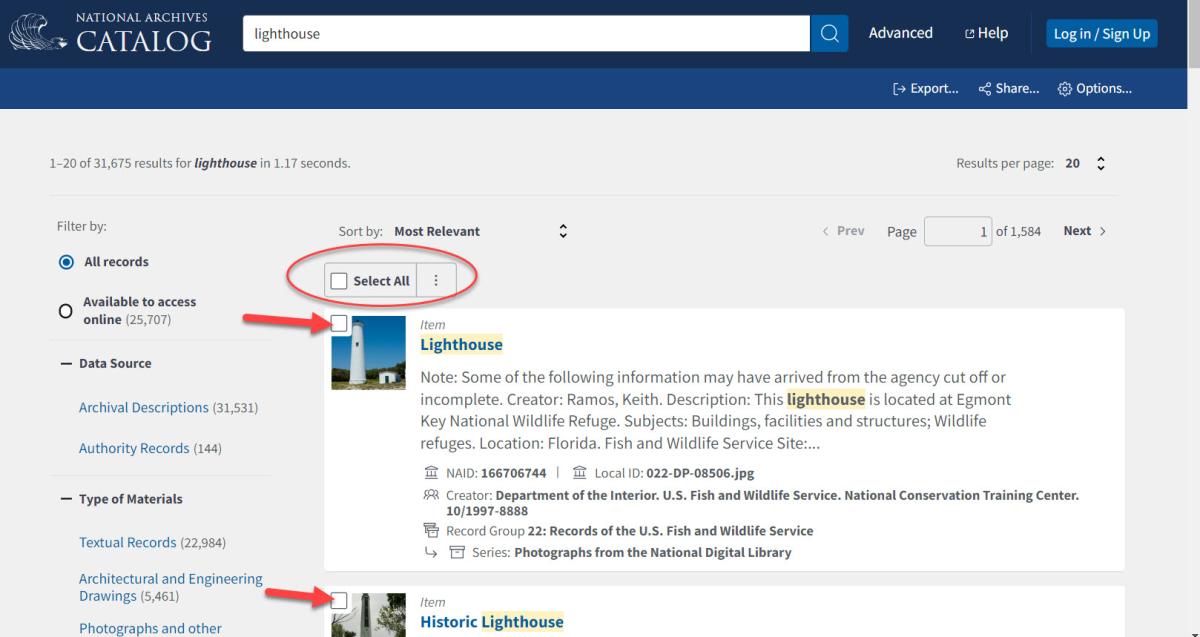
Then navigate to the Export button and select your export options. Click the blue Export button at the bottom to execute.
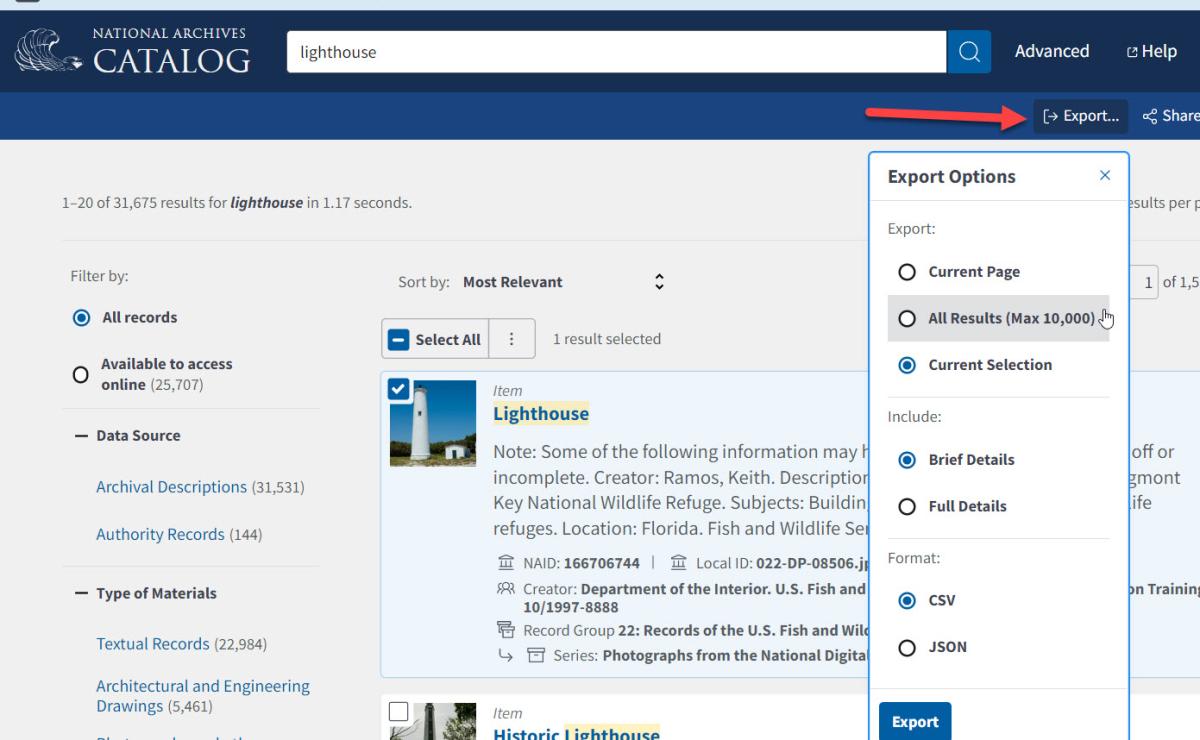
Please note - Export is currently not available from the Search Within function. We expect this function to be added to the Catalog in the near future.
Saving a Digital Copy
- Enter a search. Click a Title to view a full result.
- In the full result display, click on the download icon
 beneath the main image viewer to save the individual image.
beneath the main image viewer to save the individual image. - Advance to the next image and repeat.
Electronic Record Files
All electronic records that are available in the National Archives Catalog for viewing and/or download are linked to an archival description in the "Available Online" tab within search results.
The descriptions have options for viewing and/or downloading available files, as well as supporting technical documentation as appropriate.
Downloading Electronic Records: To save a record found in the image viewer, click on the download icon  beneath the main image viewer to save the individual image.
beneath the main image viewer to save the individual image.
To download raw data files, click on the blue download file title or right-click and select Save as or Save link as
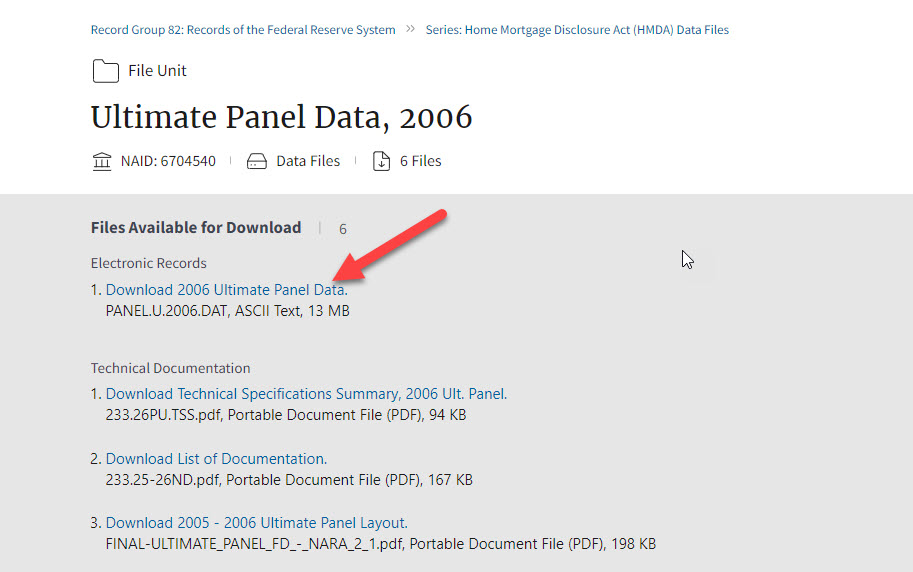
Please note that files containing raw data are usually only available for download. Please refer to the Technical Specifications Summary for details on the format of the files.
Many electronic record files do not contain a standard file extension that indicates the format or file type, so these files are usually not appropriate for viewing within the browser
Technical documentation is also available for viewing and/or downloading in the Catalog. This consists of the materials or information needed to interpret raw data or otherwise use the electronic records. These may include agency-prepared record layouts, field descriptions, code lists or meaning, user notes, and the sample questionnaires or forms the agency used to collect the data.
The Technical Specifications Summary is also provided as part of the technical documentation. This is a list of all the electronic records files for a Series or File Unit description that are available online. This list includes the technical metadata for each file, such as the byte count, file format, record length (for fixed-length records), number of records, and file identifiers and names. This metadata is usually needed for using the files after they have been downloaded.
Acronyms and Abbreviations
For a link to acronyms and abbreviations commonly used in the Federal Government, see https://ucsd.libguides.com/govspeak . The foundation for this resource was the U.S. Government Manual.
Accessibility for Persons with Disabilities
Limitations of Archival Content
The National Archives Catalog both links to and collects electronic records in a variety of formats from a variety of sources. Some of the archival content may not be fully accessible. Where NARA provides digital copies of records (e.g., documents, photographs, films, etc.), we also provide archival catalog descriptions of those records. If you require a transcript of a film or sound recording, or additional information about the records, please contact us.
Contact Us
For general or research questions, please visit https://www.archives.gov/contact
Let us know what you think—what you like and what you don't! Discover a glitch? Let us know Let us know what you think via our feedback survey.
If you:
- are experiencing an error
- have a question or comment
- have a question about the Citizen Archivist Program
- have a Catalog account issue
Please visit https://www.archives.gov/contact, select System Login or User Account Issue and then select National Archives Catalog or Citizen Archivist
